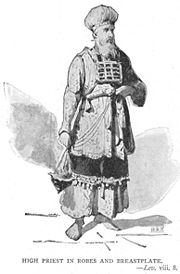
"The former priests were many in number, because they were prevented by death from continuing in office, but He holds the priesthood permanently, because He continues forever. Consequently, He is able to save to the uttermost those who draw near to God through Him, since He always lives to make intercession for them."
Also 9:24, "For Christ has entered, not into holy places made with hands, which are copies of the true things, but into heaven itself, now to appear in the presence of God on our behalf."
These two passages from Hebrews are foundational texts in the doctrine of Christ's priestly office (the others being His kingly and prophetical offices). The Westminster Larger Catechism, Question 44, describes it this way: "Christ executeth the office of a priest in His once offering himself a sacrifice without spot to God, to be a reconciliation for the sins of his people." It then elaborates on His intercessory work in Question 55: "Christ maketh intercession by His appearing in our nature continually before the Father in heaven, in the merit of His obedience and sacrifice on earth, declaring His will to have it applied to all believers; answering all accusations against them, and procuring for them quiet of conscience (notwithstanding daily failings), access with boldness to the throne of grace, and acceptance of their persons and services." Thus, His priestly office primarily has bearing on believers, rather than unbelievers, in terms of both redemption and intercession with the Father on their behalf.
XIXth Century Scottish Reformed Presbyterian minister William Symington said it brilliantly: "While His church has a want, while His people's necessities continue, He will count it his delight, His pleasure, His honour, His glory, to present their case to His Father, and to secure for them the bestowment of every needed boon."




No comments:
Post a Comment